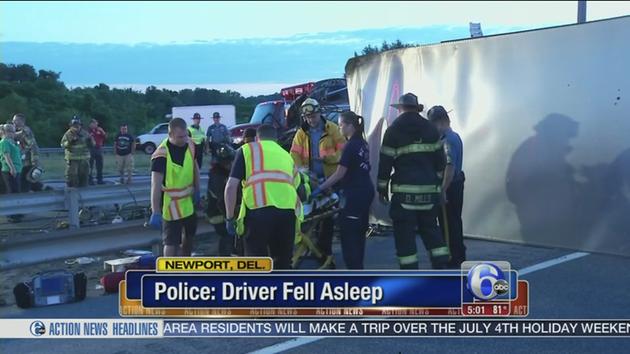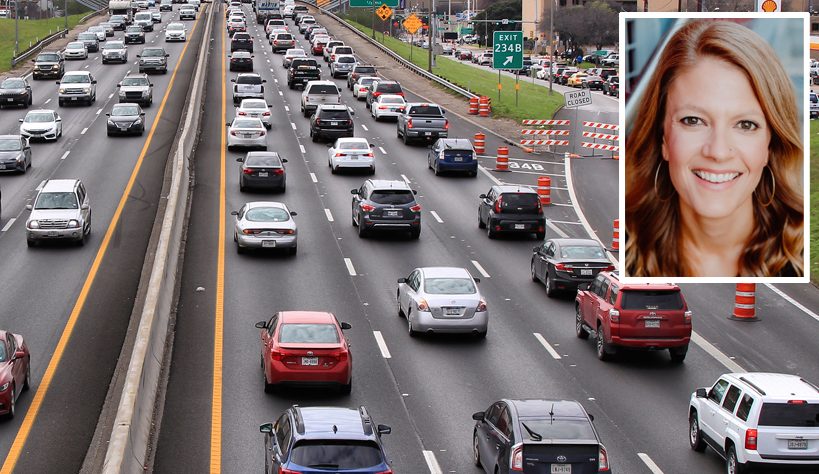Hastily-Debated Collins Measure Could Put More Tired Truckers on the Road
3:24 PM EST on December 9, 2014

It just wouldn’t be Congress if we weren’t trying to debate substantive policy changes, with drastic implications for public safety, with a government shutdown deadline fast approaching.
As Congress tries to wrap up the hideously-named “cromnibus” (continuing resolution (CR) + omnibus) spending bill for the rest of FY 2015 by Thursday, one provision is attracting a heated debate over road safety.
An amendment introduced over the summer by Maine Senator Susan Collins would repeal elements of a 2011 U.S. DOT rule requiring truck drivers to get adequate rest. The two basic pillars of that hours-of-service rule are: 1) drivers have to take a 30-minute rest break within the first eight hours of their shift, and, more contentiously, 2) drivers have to take a 34-hour “restart” period once every seven days. That 34-hour rest period must include two consecutive overnights between 1:00 a.m. and 5:00 a.m. According to Transportation Secretary Anthony Foxx, “The net effect of these changes was to reduce the average maximum week a driver could work from 82 hours to 70 hours.”
The Collins amendment would maintain the 34-hour rest mandate but would remove the requirement that it include two overnights, and it would allow drivers to take more than one restart in a seven-day period, thereby starting a new 70-hour workweek.
Truck crashes caused 3,921 deaths in 2012 [PDF]. Bloomberg News reports that the fatal-crash rate increased each year from 2009 through 2012, reversing a five-year trend.
Sec. Foxx noted in his blog post that most truckers “behave responsibly and drive well within reasonable limits,” but that the rules guard against those “who are tempted to push the limits.”
“Additionally, new research available on the subject demonstrated that long work hours, without sufficient recovery time, lead to reduced sleep and chronic fatigue,” Foxx wrote. “That fatigue leads drivers to have slower reaction times and a reduced ability to assess situations quickly.” He added that drivers often can’t accurately assess their own fatigue.

Foxx condemned the Collins amendment, saying, “The best science tells us that’s unsafe and will put lives at risk.”
Anne Ferro, head of the Federal Motor Carrier Safety Administration, says the hours-of-service rule would save an estimated 19 lives and prevent approximately 1,400 crashes and 560 injuries each year.
Opponents of the restart rule are generally concerned with industry efficiency and profits. Trucking industry groups are lined up against it, though Joan Claybrook, former president of Public Citizen and current chair of Citizens for Reliable and Safe Highways (CRASH), cautions that truckers and the trucking industry might be seeing things differently.
“Sen. Collins wants to roll back current work protections and instead allow trucking industry executives to force truck drivers to work more than 80 hours a week,” she said Monday at a news conference at the U.S. Capitol. “This is inhumane and a formula for tired truckers wiping out innocent families in preventable truck crashes. This means big bucks to the trucking companies who are exempt from federal requirements to pay overtime to their drivers."
Some also make hay that a trucker ending a shift at 2 a.m. would then need to wait 51 hours before getting back on the road, to meet the 1:00-to-5:00 requirement.
Some just object to the nanny-state nature of the regulation. “I just, I don’t know, I viscerally have an objection to the federal government going so far as to prescribe when people should sleep,” said Sen. Mary Landrieu (D-LA).
There is one reasonable, and safety-related, justification for opposing the safety rules. Keeping some trucks off the road in the middle of the night, when the roads are empty, could mean more trucks during more congested daytime hours -- when people are taking their kids to school, opponents are quick to add. Restrictions on overnight driving could also, theoretically, prevent nighttime deliveries, which have been proposed as a solution to freight congestion in cities.
On the other hand, no one is proposing that truckers stop driving at night altogether -- just that their 34-hour rest period maximize nighttime sleep.
The 34-hour restart rule has already survived a court challenge.
Foxx isn’t the only one raising a ruckus about the provisions. Sens. Cory Booker (D-NJ) and Richard Blumenthal (D-CT) sent a letter to outgoing Senate Majority Leader Harry Reid yesterday, saying, “We are extremely disappointed that despite our grave concerns, this matter is moving forward through the appropriations process, rather than with extensive study and debate. This issue is far too important to have been altered outside of the committee of jurisdiction and without debate by the Senate.”
The case of comedian Tracy Morgan, still struggling to recover from a catastrophic crash with a tired trucker last June, hangs over the proceedings. The Collins amendment was approved by the Senate Appropriations Committee two days before that crash.
Other victims have made strong statements about the possible repeal of the safety rule. “It’s outrageous that the senator from my home state would try to attach this language to a must-pass spending bill,” said Daphne Izer, founder of Parents Against Tired Truckers (PATT), whose 17-year-old son was killed in 1993, along with three of his friends, by a Walmart truck driver who fell asleep behind the wheel. She’s joined by Ron Wood, whose mother Betsy, sister Lisa, and her three children -- aged 4 years to 6 weeks -- were killed in Texas when a tractor-trailer driver reportedly fell asleep behind the wheel and crossed a median into oncoming traffic.
According to Politico, the repeal, if included in the spending bill, would be difficult to remove, considering the tight timeline and urgency of passing the bill to avoid a government shutdown Thursday. On the other hand, since it's being attached to a bill that expires September 30, 2015, the rule suspension would only be in effect for nine and a half months.
Stay in touch
Sign up for our free newsletter
More from Streetsblog USA
‘We Don’t Need These Highways’: Author Megan Kimble on Texas’ Ongoing Freeway Fights
...and what they have to teach other communities across America.
Should Wednesday’s Headlines 86 SUVs?
American tax law encourages people to buy the gas-guzzling and deadly vehicles, but some in Canada are pushing to ban them.
Brightline West Breaks Ground on Vegas to SoCal High-Speed Rail
Brightline West will be a 218-mile 186-mile-per-hour rail line from Vegas to Rancho Cucamonga — about 40 miles east of downtown L.A. — expected to open in 2028.
Tuesday’s Headlines Fix It First
How voters incentivize politicians to ignore infrastructure upkeep. Plus, are hydrogen trains the future of rail or a shiny distraction?
Why We Can’t End Violence on Transit With More Police
Are more cops the answer to violence against transit workers, or is it only driving societal tensions that make attacks more frequent?




